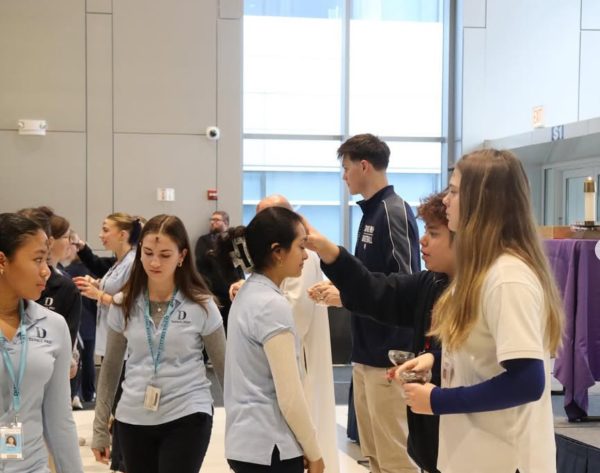New academic policies encourage time management, despite some student pushback
In the beginning of the 2021-2022 school year, DePaul Prep put a new late work policy in place stating that any late work is an automatic zero. No matter how late the assignment is turned in, there is no credit given. In addition, a new retake policy was put into effect. This policy stated that a test could only be retaken if the student scored less than a 70%. Originally, the student’s new retake score was not limited. However, this was recently changed to the student only being able to earn a maximum of 70% on their retake. This means that even if a student scored 100% on their reassessment, their grade would be put in as 70%.
These policies are a significant change from those implemented during last school year. Previously, 10% was taken off a student’s grade for each day it was late, until it became a zero on the fifth day of not being turned in. Students also had the ability to retake as many summative assessments as they chose. The large differences between the past and current policies have caused changes in the lives of both students and teachers in the DePaul Prep community.
In order to understand the policies, it’s important to understand why they were put in place. In the past, DePaul Prep had practiced an eight period schedule, in which students would attend all eight classes everyday. Beginning last year, DePaul Prep adopted a block schedule, in which students only attend four classes daily. These four classes alternate each day, creating two days between when a student attends a specific class. According to DePaul Prep’s Principal, Dr.Stanton-Anderson, “There was a decrease in the number of classes that students had to do homework for, and there was an additional day to do the homework.” The DePaul Prep administration felt justified in their decision to make late work zeroes, because more time was being given to students to complete their work.
In addition, DePaul Prep’s administration felt that these implementations will benefit students in the long run. “The reason for no credit is that we want kids to get used to the real world,” Dr. Stanton-Anderson added on. Later on in student’s lives, they will face harsh deadlines. The idea is that building the habits of time management and understanding requirements through these policies can only help them in the long run.
In regards to the new retake policy, the school administration felt that change had been needed previously due to many students taking advantage of the retake system. Dr.Stanton-Anderson explained, “Students were bombing the first try at an assessment so they could get a chance and more time to study.” Creating less opportunities for retakes works to make an equal playing field by preventing students who didn’t try originally from earning the same grade as students who studied for the original test.
Teachers have been greatly affected by the new policies as well. The changes have positively impacted the lives of teachers and their classrooms. They no longer need to chase after students for missing assignments, because once it isn’t turned in by the due date they are able to automatically enter a zero into the grade book. For English teacher Ms. Morris, this allowed more time to focus on teaching. “The new late work policy has given me more of an opportunity to give kids feedback faster and also allows me to continue on with units, because I know that all of my students have done the work,” Morris said.
The new policies cause the classroom learning environment to be organized, because everyone is always on the same page, Morris added. In addition, not having to focus on collecting past assignments has allowed both students and teachers to move forward in topics with clear minds. Overall, the changes in policies have made teachers’ jobs easier by decreasing the amount of chaos they deal with on a daily basis.
What has made these policies so controversial for some of DePaul Prep’s students is the hardships these students say that the policies have created. The automatic zero of a missing assignment can have a significant impact on a student’s grade. Even if they did the work and forgot to turn it in, their grade can suffer. Junior Amanda Dillion says, “I missed one assignment and my grade went down excessively.”
While it’s not uncommon for students to be penalized for not completing assignments on time, some have said that not being able to gain any points ruins any motivation they may have to complete it after the due date. They feel that it’s hard to maintain a positive mindset when their grades and work ethic are being damaged by the policy, especially when it doesn’t take into account a lot of factors such as WiFi and technology issues.
In addition to the late work policy, Dillon feels the retake policy has negatively impacted her studies. “The retake policy has increased my testing anxiety, because I know I may not be able to receive the grade I deserve if I don’t do well on the test the first time,” she explained. Dillon is not alone when it comes to the retake policy causing stress. Some students find it harder to feel confident when more is on the line and they don’t have the opportunity to retake many assessments.
Although the policies have potential negative effects on students, there are some spoken positives. The strictness of the late work policy forces students to develop time management skills they may not obtain otherwise. Dillon admits, “Due to the late work policy, I have been more on top of my homework than in previous years.” The fear of a zero drastically lowering a student’s grade is enough to make them put in the extra effort to complete all of their work on time. In addition to the late work policy, the retake policy has helped students build healthy habits. Knowing there won’t always be a chance for a reassessment forces students to study for their tests. The ability to procrastinate studying is taken away when there are no second chances.
Whether the developments in the late work and retake policies at DePaul Prep have been positive or negative differs from many different perspectives. The school is in a unique phase while it is transitioning from hybrid learning and COVID back into its normal procedures. It is a lot harder for many students and staff members to get used to some of the rules and regulations that had been abandoned during the last few years. Although, there is never going to be a policy that makes every individual happy. In order for them to be effective, some sacrifices will always have to be made.





